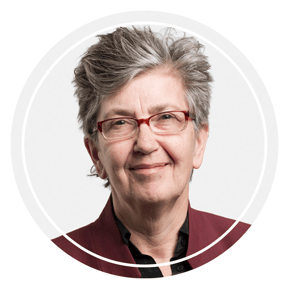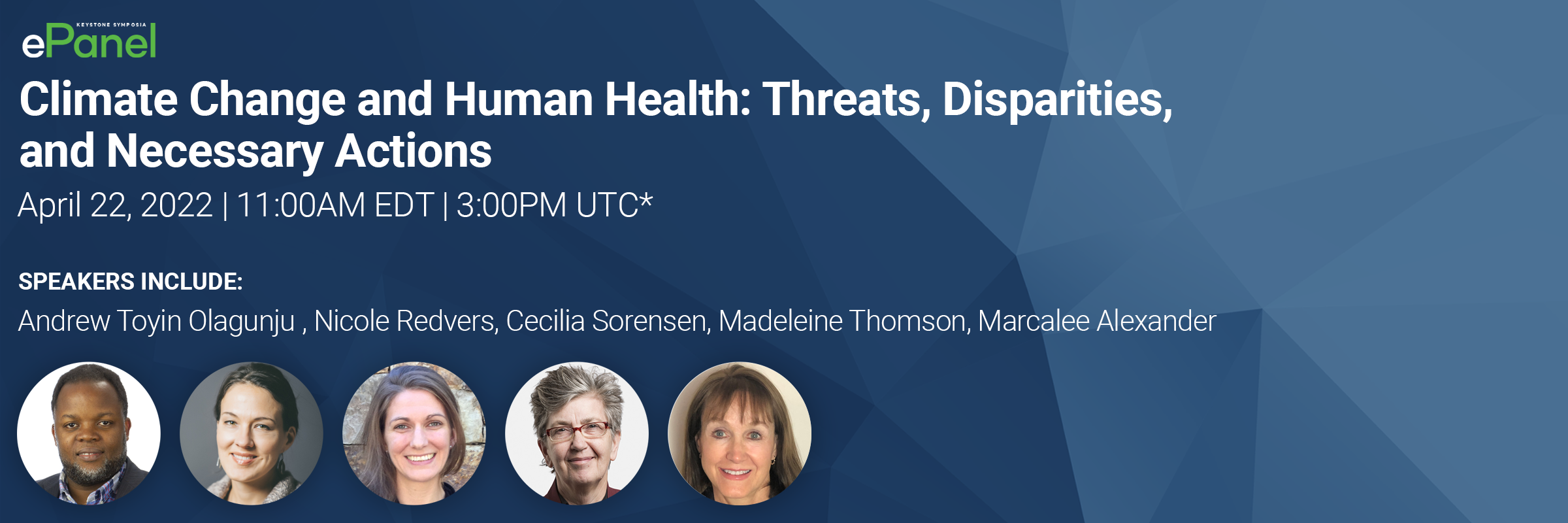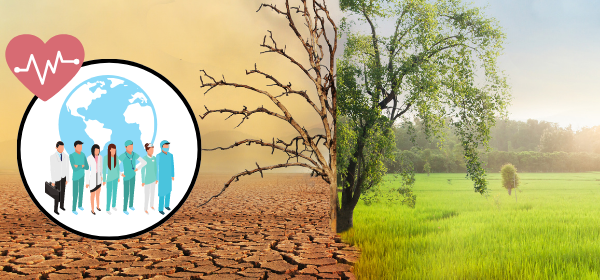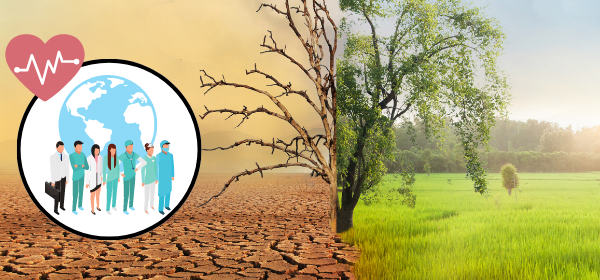Climate Change and Human Health: Threats, Disparities and Necessary Actions ePanel On Demand
|
On Earth Day, 2022, we launched our Climate Health ePanel series in collaboration with the Global Consortium on Climate Health and Education, with the inaugural ePanel on Health Threats, Disparities and Necessary Actions. The free ePanel event provided a broad overview of how climate related exposures – such as extreme heat, wildfires, drought and extreme weather events – threaten human health worldwide. In particular, we examined the disproportionate impacts on vulnerable populations, including African nations, indigenous peoples, persons living with disabilities, women, mothers and children. We gained perspectives from clinicians, researchers, journal editors, educators, non-profit foundation leaders and public health policy experts to holistically assess these challenges and identify ways the scientific community can get involved and take action against these impacts and inequities. Learn more about the backgrounds and expertise of our panelists below!
The Event Recording is Now Available On Demand!Watch the panel discussion below:
|
Find out more about the Climate Health ePanel Series on the Keypoint Blog
Meet the Panelists

Marcalee Alexander, MD
President, Sustain Our Abilities
Editor-in-Chief, The Journal of Climate Change and Health
Marcalee Alexander, MD is a specialist in Physical Medicine and Rehabilitation with special expertise in spinal cord injury (SCI). Having graduated Jefferson Medical College in 1983, she was the first female President of the American SCI Association and led ground-breaking translational research regarding the neurologic control of female sexual response. In 2019, frustrated by an inability to motivate rehabilitation professionals and persons with disabilities to take action regarding climate change, she began an awareness walk from Canada to Key West regarding disasters, disability and climate change and the need for an accessible, health-promoting environment. She needed to pause the walk in 2020 in Rocky Mount, North Carolina due to Covid19; however, she concomitantly founded and is President of the 501C3 Sustain Our Abilities, that provides education without borders related to disability and rehabilitation and targets community as a mechanism that can conquer climate change. Dr. Alexander is founding Editor-in-Chief of The Journal of Climate Change and Health, a green open-access journal she launched in conjunction with Elsevier in 2020. Moreover, she developed the idea of October 22nd as Day for Tomorrow, a parallel to Earth Day where people of all ages and walks of life can come together to foster disaster preparation, environmental justice, awareness and action against climate change. As the moderator for our inaugural panel, Dr. Alexander brings her expertise in education, research, rehabilitation and climate justice to collaborate with other experts and explore how scientists and clinicians can work together to improve future health in a world overwhelmed by the climate crisis.

Cecilia Sorensen, MD
Director, Global Consortium on Climate and Health Education
Associate Professor of Environmental Health Sciences, Mailman School of Public Health
Associate Professor of Emergency Medicine, Columbia University Irving Medical Center
Cecilia Sorensen, MD is the Director of the Global Consortium on Climate and Health Education at Columbia University, Associate Professor of Emergency Medicine at Columbia Irving Medical Center and Associate Professor of Environmental Health Sciences at Mailman School of Public Health, Columbia University. Dr. Sorensen received her Doctor of Medicine from Drexel University College of Medicine and completed a four-year emergency medicine residency at Denver Health. Following residency training, she completed a 2-year fellowship in climate change and human health policy with the National Institute of Environmental Health Sciences (NIEHS). Her work focuses on the intersection of climate change and health and how policy solutions, clinical action and education can build resilience in vulnerable communities. She currently serves on the working group for the National Academy of Medicine’s Climate and Human Health Initiative. She was an author for the U.S. Fourth National Climate Assessment and serves as a technical advisor for the Lancet Climate and Health U.S. Policy Brief. She is the co-editor of the textbook Climate Change and Human Health: From Science to Practice.

Nicole Redvers, MD
Assistant Professor, University of North Dakota
Board Chair, Arctic Indigenous Wellness Foundation
Editorial Board Member, The Journal of Climate Change and Health
Dr. Nicole Redvers, ND, MPH, is a member of the Deninu K’ue First Nation in Denendeh (NWT, Canada) and has worked with Indigenous patients, scholars, and communities around the globe her entire career. She is an assistant professor in the Department of Family and Community Medicine and the Department of Indigenous Health at the University of North Dakota where she helped developed and launch the first Indigenous health PhD program. Dr. Redvers is co-founder and current board chair of the Canadian charity the Arctic Indigenous Wellness Foundation based in Yellowknife, NWT, providing traditional Indigenous-rooted Land-based wellness supports to northerners. She has been actively involved at regional, national, and international levels promoting the inclusion of Indigenous perspectives in both human and planetary health research and practice. She is author of the trade paperback book titled, ‘The Science of the Sacred: Bridging Global Indigenous Medicine Systems and Modern Scientific Principles’.

Andrew Olagunju, MD, MS
Assistant Professor, McMaster University, Canada
Associate Editor, The Journal of Climate Change and Health
Psychiatrist, St Joseph's Healthcare Hamilton, Ontario, Canada
Dr. Olagunju is an assistant professor at the Department of Psychiatry and Behavioural Neurosciences, McMaster University, and a Psychiatrist at St. Joseph’s Healthcare Hamilton, Canada. He is a Research Fellow at the University of Adelaide, Australia and a Collaborator on the global burden of diseases project, University of Washington, Seattle USA. Previously, he was a Senior Lecturer at the College of Medicine, University of Lagos and an affiliate in Research with King’s College London. Dr Olagunju is a member of the Advisory Board, for the Institute of Neurosciences, Mental Health and Addiction, Canadian Institute of Health Research (CIHR). He is Associate Editor with the Journal of Climate Change and Health, and Frontier in Psychiatry (Section on Public Mental Health and Psychology).
His background includes MBBS from the University of Ilorin, psychiatric residency at the University of Lagos (FMCPsych, and FWACP), and Master of Science (MSc) degree in International Humanitarian Action (module on Epidemiology and Health Policy) from University College Dublin (European Union Commission Erasmus Mundus scholar). He completed an Australian Government sponsored postgraduate training in translational psychiatry at the University of Adelaide and a Clinical Fellowship at McMaster University.
He devotes his time to medical education and cutting-edge research in climate change and mental health, psychiatric epidemiology, public mental health, health service evaluation, global health, and the application of translational medicine in psychiatry. He has over 160 publications, including papers that are highly cited (50,000+ citations, H-index=54). He has received recognition for his research work, including awards, from the Society of Biological Psychiatry, American Society of Clinical Psychopharmacology, and Japanese Society of Psychiatry and Neurology.
He is a founding board member of Patela Care Foundation, a non-governmental organization in Nigeria with mainstream health programs for undeserved population to promote equitable access to health services.

Madeleine Thomson, PhD
Head Climate Impacts, Wellcome Trust
Visiting Professor, Lancaster University, UK
Dr Madeleine Thomson is Head of Climate Impacts at the Wellcome Trust; a politically & financially independent foundation which supports science to solve the urgent health challenges facing everyone. Prior to this role she was the interim Head of Our Planet Our Health at Wellcome.
Dr Thomson is also a visiting Professor at Lancaster University, UK and a retired professor at Columbia University, New York where she previously held senior research positions at the International Research Institute (IRI) for Climate and Society and the Mailman School of Public Health. While at IRI she served as Director of the WHO Collaborating Centre on Early Warning Systems for Malaria and Other Climate-Sensitive Diseases and was co-chair of the cross Columbia working group on global health security.
Originally trained as a field entomologist she spent much of her early career undertaking operational research to support large-scale health interventions in Africa. She was educated at the University of Sheffield (BSc), Imperial College London (MSc) and the University of Liverpool (PhD).
This event is organized in collaboration with:

Related news
Climate Health & Medicine ePanel Series Launched on Earth Day, 2022
As the impacts of climate change are becoming increasingly severe worldwide, Keystone Symposia and...
Keystone Symposia Climate Initiatives
Over the course of the last 50 years, Keystone Symposia has convened conferences that connect...
Climate Health Master Class- Open Access & On Demand
The threat of climate change in now well-recognized as one of the greatest challenges we will face...





